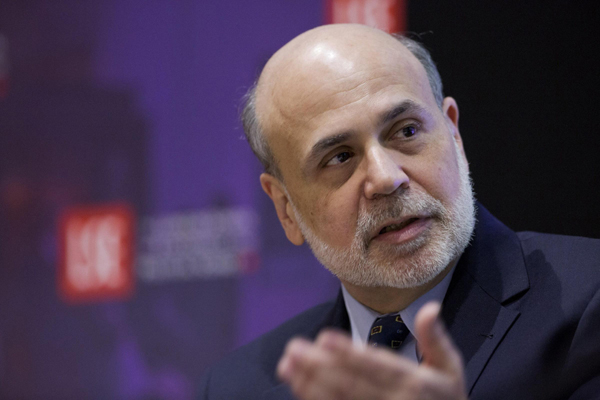Bernanke rationalizes monetary easing policies
Updated: 2013-03-26 10:44
(Xinhua)
|
|||||||||||
 |
|
Chairman of the the U.S. Federal Reserve Ben Bernanke speaks at the London School of Economics in London March 25, 2013. [Photo/Agencies] |
WASHINGTON - US Federal Reserve Chairman Ben Bernanke on Monday rationalized monetary easing policies in major advanced countries by saying they would boost growth and benefit the world's emerging economies as well.
In prepared remarks at the London School of Economics, Bernanke defended the Fed's policy and similar stimulus measures taken by other central banks since the 2008 financial crisis, saying they are "currently pursuing appropriately expansionary policies to help support recovery and price stability in their own countries".
Bernanke argued that the ultra-loose monetary measures don't constitute competitive devaluation because one would expect large and persistent changes in the configuration of exchange rates among these countries.
Instead, he said, the benefits of monetary easing come from the support for domestic aggregate demand in each country or region.
"Because stronger growth in each economy confers beneficial spillovers to trading partners, these policies are not 'beggar-thy-neighbor' but 'enrich-thy-neighbor' actions," Bernanke said.
"The distinction between monetary policies aimed at domestic objectives and trade-diverting exchange rate devaluation or other protectionist measures is critical," he said.
Last week, the Fed pledged to keep its open-ended asset purchase program to push long-term interest rates down until the outlook for the labor market improves substantially.
In late 2008, the central bank of the world's largest economy cut the federal funds rate to record lows in response to the financial crisis and began to harness unconventional tools to stimulate the economy.
The Fed launched two rounds of large-scale quantitative easing in 2008 and 2010 and began another round of its open-ended asset purchase program in 2012.
Critics have argued that the low-interest-rate policies could trigger competitive devaluation among the world's major economies and as a result drag the trade competitiveness of emerging countries.
While stating that the mutual benefits of monetary easing among the advanced economies are clear, Bernanke acknowledged that the case of emerging market economies is more complicated.
However, he concluded that a return to solid growth among the advanced economies is ultimately in the interest of advanced and emerging market economies alike.
Related Stories
Bernanke to push QE, saying jobs' data prove it works 2013-03-11 05:55
Today's Top News
Police continue manhunt for 2nd bombing suspect
H7N9 flu transmission studied
8% growth predicted for Q2
Nuke reactor gets foreign contract
First couple on Time's list of most influential
'Green' awareness levels drop in Beijing
Palace Museum spruces up
Trading channels 'need to broaden'
Hot Topics
Lunar probe , China growth forecasts, Emission rules get tougher, China seen through 'colored lens', International board,
Editor's Picks

|

|

|

|

|

|





